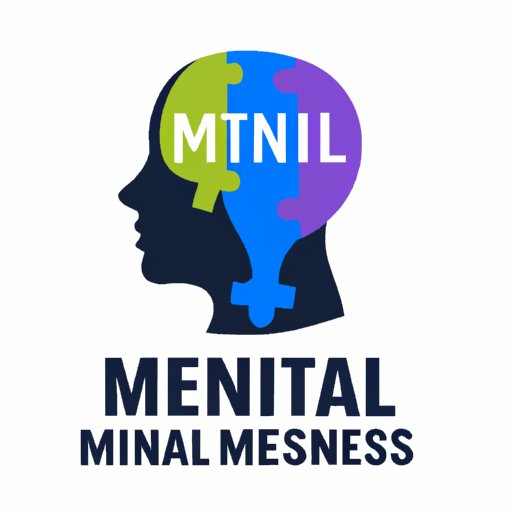
Introduction
Mental illness has become an increasingly important and relevant topic in today’s society. With the rise of mental health awareness, more people are seeking answers about their own mental health challenges. However, it can be difficult to navigate the grey area between normal emotional ups and downs and a diagnosable mental health disorder. This article aims to provide a guide to understanding when to seek help for mental illness by breaking down common misconceptions and stigmas surrounding mental health disorders, recognizing the signs of mental health challenges, and finding support.
Navigating the Grey Area: A Guide to Understanding When to Seek Help for Mental Illness
Mental illness can encompass a wide range of disorders, from anxiety and depression to bipolar disorder and schizophrenia. It is important to note that mental health challenges are not a sign of weakness or a personal failing, but rather a medical condition that can be treated with the right care. The grey area lies in the difficulty of determining when normal emotions and behaviors cross into the realm of a mental health disorder.
Common misconceptions and myths surrounding mental illness can also contribute to this confusion. Many people believe that seeking help for mental health challenges is a sign of weakness or that it is something that can be overcome with willpower alone. However, seeking professional help is a sign of strength and self-care. It is also important to recognize that mental illness can have physical symptoms as well, such as fatigue, changes in appetite or sleep patterns, or physical pain.
Recognizing when it may be time to seek professional help can be the key to early intervention and improved outcomes. Some signs that it may be time to seek help include persistent feelings of sadness or hopelessness, changes in sleeping or eating patterns, difficulty concentrating, increased substance use, or thoughts of self-harm or suicide. It is important to remember that seeking help early on can prevent symptoms from worsening and leading to more serious mental health disorders.
The Stigma of Mental Illness: Breaking Down Barriers to Seeking Treatment
Despite the increasing awareness of mental health challenges, there is still a negative stigma associated with mental illness that can prevent people from seeking help. Negative stereotypes, such as the idea that mental illness is a personal failing or that those with mental health disorders are violent, can lead to shame and embarrassment for those struggling with mental health challenges, preventing them from seeking the care they need.
Breaking down the stigma surrounding mental illness is crucial in promoting mental health awareness and encouraging people to seek help when they need it. This can be done through open conversations about mental health, providing education about the many different forms of mental illness, and advocating for access to affordable mental health care. Resources such as mental health hotlines, support groups, and therapy can also help individuals overcome the stigma and receive the help they deserve.
Is it Normal or a Sign of Something More? 5 Signs You Should See a Mental Health Professional
It can be difficult to distinguish between normal emotions and behaviors and those that indicate a mental health disorder. However, recognizing the signs that may indicate the need for professional help can lead to early intervention and improved outcomes. Some signs that it may be time to seek help include:
- Persistent feelings of sadness or hopelessness
- Changes in sleeping or eating patterns
- Difficulty concentrating or making decisions
- Feeling disconnected from others or losing interest in previously enjoyed activities
- Increased substance use or reckless behavior
It is important to remember that even if these signs are mild or seem “normal,” they can still be indicative of a mental health disorder and should be addressed with professional care.
Do I Have a Mental Illness? A Personal Journey to Seeking Answers and Finding Hope
Personal stories can be a powerful way to help others recognize the signs of mental health challenges and inspire them to seek help. One person’s journey to seeking a diagnosis and treatment for mental illness can provide hope and encouragement for others who may be struggling with similar challenges.
It is important to acknowledge the challenges and emotions involved in seeking a diagnosis and receiving treatment for mental health disorders. The fear of being labeled as “crazy” or the shame of admitting to struggles with mental health can be daunting. However, seeking help is a brave and courageous step toward healing and wellness.
If you are considering seeking help for mental health challenges, know that you are not alone. There are many resources and support systems available to help you on your journey toward improved mental health.
The Importance of Self-Assessment: Recognizing the Signs of Mental Health Challenges and Finding Support
Self-assessment and self-awareness can be valuable tools in recognizing the signs of mental health challenges and finding the support you need. There are a variety of self-assessment tools and resources available online that can help you evaluate your mental health status and determine whether further evaluation is necessary.
It is also important to find support from friends, family, or mental health professionals. Building a supportive network can help ease the feelings of isolation and loneliness that often accompany mental health challenges.
Conclusion
Mental health challenges can be difficult to navigate, but seeking help is a crucial first step toward healing and wellness. By breaking down stigmas and myths surrounding mental illness, recognizing the signs of mental health disorders, and finding support, individuals can take control of their mental health and live fulfilling lives. Remember, mental illness is not a sign of weakness, but rather a medical condition that can be treated. Help is available, and recovery is possible.





